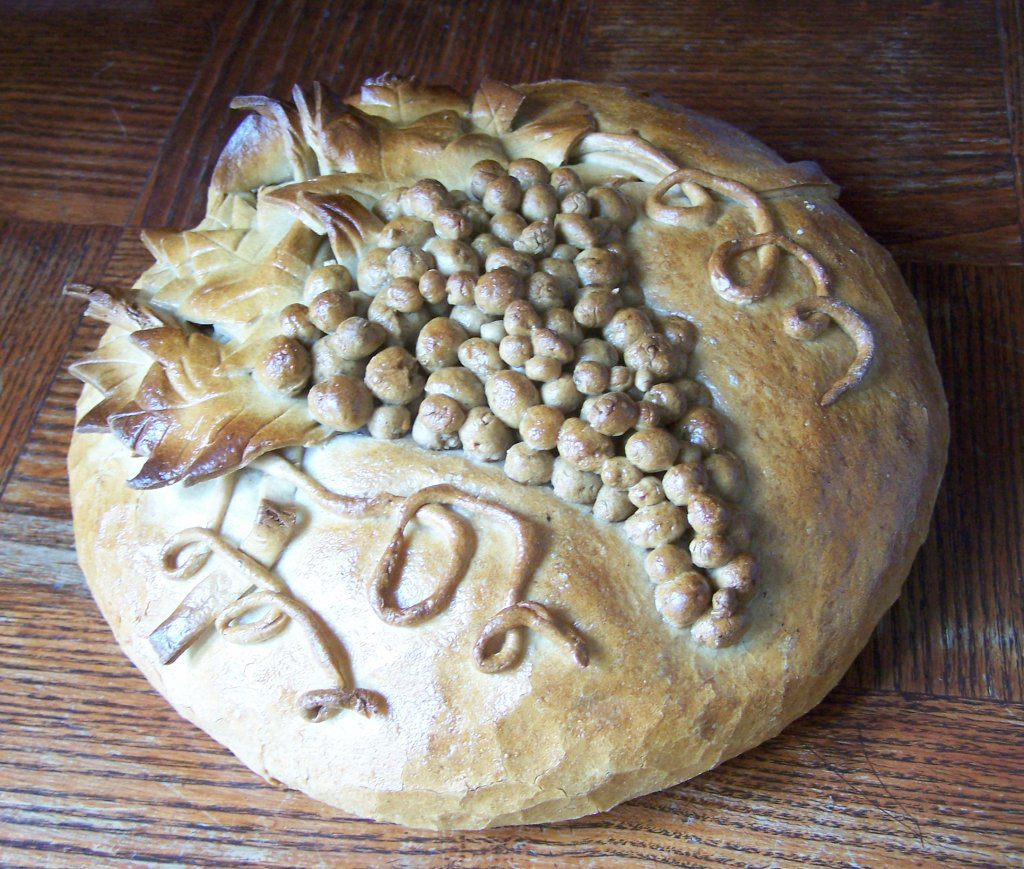Sermon: Food for the Journey

Sermon Texts
Ephesians 4:1-16
John 6:24-35
The Bible and Food
A surprising amount of the Bible is focused on food. We not only have God feeding the children of Israel with bread from heaven and Jesus miraculously feeding the multitudes, but also many other readings that concern food and drink: Jesus changing water into wine; the apostle Paul writing about the importance of sharing meals as a unified community; and even Moses relaying God’s laws about what foods the children of Israel were and were not permitted to eat. I was raised to think of the Bible as a book that was mostly concerned with God – – so why does so much of it talk about food? Well, the more I read it, the more I understand that it is actually a book about the relationship between God and we human beings. And if you want to have a relationship with human beings, there has got to be some food involved.
The average American will consume over 85,000 meals in their lifetime – – and that doesn’t include snacks. Eating food is one of the most basic and mundane features of human life. The bowl of oatmeal that I ate this morning is – – was – – as ordinary a thing as you could find. And yet, the God who created and sustains the whole universe is deeply concerned with our food: God wants us to have enough to eat, God wants us to have the right kind of food to eat, and God wants us to share and enjoy our meals together; with one another, and with God. God has taken the most mundane aspect of our lives and sanctified it – – God has made it holy. Through God, our food becomes a means by which we not only nourish our own bodies, but also our relationships with family, friends, community, and with God. Nothing builds relationships like a shared meal.
It Does a Body Good
All of this talk about food has got me thinking about all of the nutrition-related information I received as a child. Television regularly told us that “Milk does a body good,” while our schoolteachers advocated for the “Food Pyramid” – – the official USDA-recommended plan for healthy eating. I doubt that either of these gimmicks would hold up to present-day scrutiny, but the idea that we need the right kind of food to do what we need to do is still a sound one. Witness our grocery store shelves, which are now filled with food products designed to fuel specific human endeavors: protein shakes for bodybuilders, energy bars for trail runners, electrolyte replacement drinks for long-distance cyclists. We need the right kind of food to fuel the work that we hope to accomplish.
Our reading from Ephesians describes some of the work that we may be called to do as Christians: teaching, speaking the truth, advocating for justice, leading by example, and even just caring for our fellow human beings. Each of us is called to some kind of work – – work that benefits humanity, makes the world a better place, and helps make God’s love known here on earth. This is the kind of work that will grow the church – – literally and figuratively. Paul’s letter teaches us that the ministry work that people do helps not only to unify the church and bring it closer to God, it promotes the growth of the Body of Christ which is the church.
We live in a world that is plagued with many challenges. Right here in our own country, there are many people who are facing poverty, hunger, addiction, and despair. There are a lot of people out there who wonder if anyone cares about them, if anyone will help them address their problems. As Christians, we know that the answer to their question is, “Yes!” Because we love them, as Jesus commanded us to love our neighbors. Just like Jesus used his body while walking on this earth to feed, to heal, to teach, and to console – – so also does the church, the mystical Body of Christ, reach out its hands in love. That means that each one of us, as Christians, needs to keep our eyes and ears open. We need to watch carefully for all of the needs of our community – – the needs that are obvious, and the needs that are harder to see. We can trust that once the needs are seen, our hearts will respond with Christ’s love, and do the work God has called us to do.
Fueling the Work
The big question that remains is this: where do we find the energy for this? I don’t know about you all, but I get exhausted just watching or reading the news every day. I get a little bit of compassion fatigue and sometimes become overwhelmed with everything that is going on the world – – and that’s before I’ve even done anything. And even when I learn about a situation that I might be able to help with, it can be difficult to muster the sustained energy that is needed to see the work through. So, what can we do to find the energy to grow that Body of Christ and do the good works that we want to do?
The answer is Jesus. (The answer is always Jesus.)
Jesus is pointing us in the right direction here in the Gospel of John. Last week, we read about how Jesus fed the five-thousand. Why did he feed them? Because they were hungry and needed food! We all know how cranky we can get when we’re hungry – – well, multiply that by five-thousand. Jesus understood then, and understands now, that human beings have physical needs that must be fulfilled. So we need to understand that, too. We need to take care of our own selves. Eat good food, get plenty of rest, take that vacation, wear sunscreen. We need to treat ourselves as if we are God’s beloved child, because we are.
But after our own needs are met, we need to get focused on our work. This is the admonishment that Jesus gives to the crowd in today’s gospel: you’ve had your fill of loaves, now it is time to get to work. And Jesus says to not work merely for ordinary food that perishes, but also for that eternal food that God will provide us. What is this eternal food, this “bread of life”?
To my mind, the bread of life is the love of God in our lives. The knowledge of just how much God loves each and every one of us – – that is powerful knowledge that is full of life-giving energy. When we open our hearts to God’s love, we receive so much that our bodies cannot contain it. God’s love spills out from us, it flows out into the world. When we remember how God loves us, how God blesses us, how God walks beside us even in our most challenging moments – – we cannot help but share that love with other people. We all have different ways of sharing – – some of us preach, some of us cook, some of us visit, some of us heal, some of us clean, some of us teach. But our work, our ministry, always represents an outpouring of God’s love. And when the love of God, that bread of life, starts pouring out from us, we begin to hear people say those words: “Give us this bread always!”
I know that many of you are looking forward to your RIM church picnic today. My hope and prayer is that there will be plenty of both kinds of food there: the food that we prepare for one another, and the eternal food that God gives to us. I hope that each and every time we reach out for something to eat, we can remember that food is not just a gift from God to nourish our bodies; it is also a gift that builds up our families, our churches, and our communities. Breaking bread together builds connections and relationships in unique and powerful ways. It can restore our bodies, renew our spirits, and bring us into a closer relationship with the Holy One. Let us always be thankful that God has sanctified our hunger, and will always give to each of us, the bread of life.


